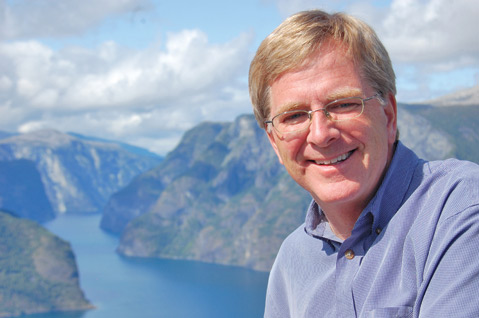Interview: Rick Steves
Multimedia Travel Meister Comes to S.B.

Ten minutes into a discussion with professional happy wanderer Rick Steves, on the phone from his hometown near Seattle, about other travel writers and the ongoing philosophical competition between journey and destination, he suddenly stops. “What are we doing?” he asks with enough genuine curiosity to give my laughter a hollow death. It’s not a joke. Just for the record, I remind him we’re talking to pave the way for his appearance at the Granada.
“Oh,” he says, “and what am I talking about?” followed by the sound of shuffled papers; then yes, he said, it’s about “Lessons from a Lifetime of Travel.” Okay, then, he asks, “When does this interview begin?”
Steves ought to be forgiven his mild confusion, which he later swore had nothing to do with either the accumulated culture shock or jet lag inherent in traveling three months of each year. Likely, this brief disorientation was due to everyday pressures. Steves produces a weekly NPR radio show and weekly PBS television, not to mention this new book and the annual grind of updating his most famous work, Europe Through the Back Door, which first appeared in 1980.
“You know I’m not very well-read when it comes to other travel writers,” he confessed. “I do read a lot of nonprofessional books, and people constantly send me their travel journals.”
“And you read them all?” I ask, incredulous. “I try to,” he said. There is something more kindly professor than intrepid traveler as Steves’s voice summons visions of Mr. Rogers. But he came upon this persona authentically; a former piano teacher and tour guide, he only wanted to make the continent easier for people of his ilk. The occasion for philosophical waxing about on-the-road dharma, however, was prompted from his recent hosting of part-time Santa Barbaran Pico Iyer on his radio show, where they explored topics more psychological than logistic — helpful hints for making a global soul rather than braving customs.
“I think of my career in terms of Maslow’s theories of self-actualization,” said Steves, surprisingly. “My first years were all about physiological needs.” Travel tips were the equivalent of food and oxygen in his first books; then, he said, came the enthusiastic cultural side, the books meant to build aesthetics into the mix. “But in my last decade, I’ve been passionate about getting people to travel outside their comfort zones; this is the pinnacle: traveling as a political act,” he said. People need to find themselves in places that speak another tongue to find something beyond their assumptions. Presumably he will elaborate on this theme when he comes to the Granada Theatre next week.
So which is more important, journey or destination? I asked the man who seems obsessed with both. He thought for a second. “It depends on which one changes you,” he said.
The most interesting factoid about Rick Steves is the fact that even though he travels three months every year, he lives in the town where he grew up; in fact, his office overlooks the junior high schoolyard he attended. “I’m looking at it right now,” he chuckled.
So is he the ultimate homebody passing himself off as the inveterate trekker? “First, let me say that even though I travel three months a year, I bet I love this town as much as anybody who never leaves. Maybe more. Living in the north part of Seattle made me think about being a good steward of the place where I live. But I’ve been traveling for one-third of my adult life, and I consider it all time and money well spent. I want to celebrate the world, not be afraid of it. I also want to inspire people to get up and go to places where other truths are self-evident. I want to help people rearrange their preconceptions. You know one of the most amazing places I’ve ever been is India,” said Steves, who currently yearns to go to the South Seas just for fun. “People ask, isn’t there a lot of suffering there? But what I think is that there is more joy there in just daily life, and there is probably just as much suffering right here.” —D.J. Palladino
4•1•1
Rick Steves comes to town Monday, December 9, at 8 p.m. at the Granada Theatre (1214 State St., 899-2222). Tickets are $21-$43 (general) and $16 (UCSB students). For more information, call Arts & Lectures at 893-3595 or visit artsandlectures.ucsb.edu.



